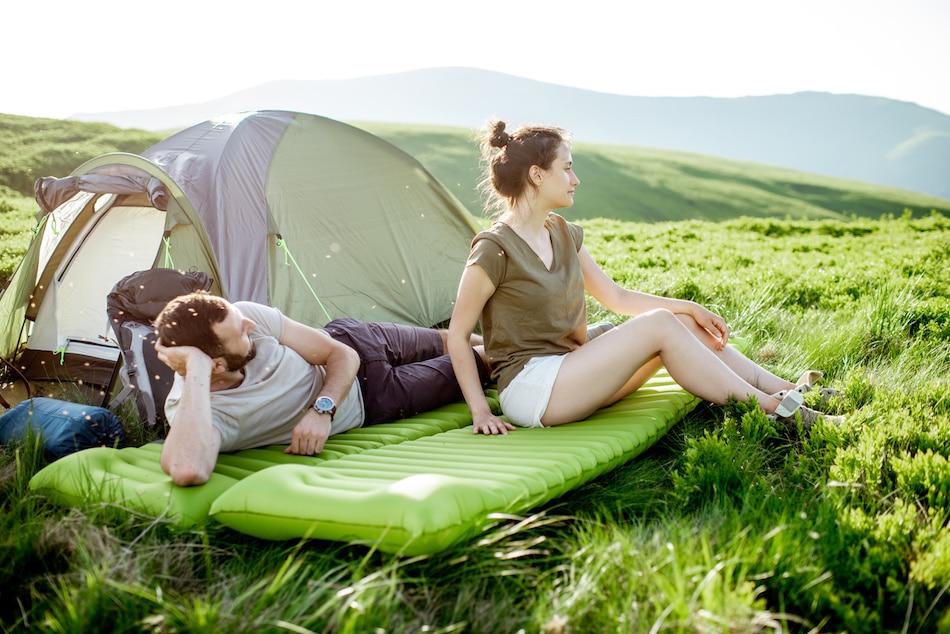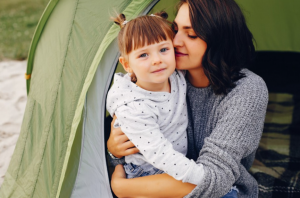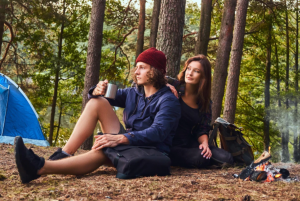What We'll Cover
- How Do You Make Sure You’re Being Courteous While Camping?
- Be Mindful of Campsite Quiet Time
- Respect the Space of Your Camping Neighbors
- Respect Your Camping Space
- Understand Campfire Safety
- While Camping, Keep Food Stored Properly
- Control Pets and Kids While Camping
- Camping and RV Gray and Black Water Concerns
- Leave No Trace After Camping
How Do You Make Sure You’re Being Courteous While Camping?
When soaking in the glories of the great outdoors, campers are living in the home of Mother Nature and wildlife. These spaces should be treated with the utmost courtesy. Furthermore, these areas are shared with other campers, who also deserve to be respected.
By following these few simple tips for camping etiquette, individuals and groups can ensure that they don’t become the ‘bad apples’ of the campground.
Be Mindful of Campsite Quiet Time
Most camping grounds have set hours considered ‘quiet time,’ which generally fall between 10 p.m. and 6 a.m.
As straightforward as this is, excessive noise during quiet time is the number one complaint many campers have. Once the hour arrives, avoid letting children or pets make excessive noise, and go easy on the music and vocal volumes. And cooking after hours, even using the best camping iron skillet, can cause noise, smoke and smells. Arriving late? Use low beam lights, keep noise to a minimum, and disengage car alarms to prevent waking the campground if it goes off.
Respect the Space of Your Camping Neighbors
A campsite is akin to a home yard, and no one appreciates their yard becoming a shortcut. Show neighbors respect by quietly passing by their space, and encourage children and pets to do the same. However, there’s nothing wrong with getting friendly with neighbors who are open for company.
Respect Your Camping Space
Treat the campsite just like home, and keep the space tidy at all times. Remove all debris as soon as possible, and set an example for other campers. And as tempting as it may be, don’t do any rock stacking. While it may be tempting to hang a clothesline or dig a trench around the tent for drainage purposes, this shouldn’t be done without permission from the grounds manager. As a courtesy to neighbors, also inquire whether any campsite additions will be a nuisance to them beforehand.
Understand Campfire Safety
Campfires are a staple of the outdoor living experience, and often become a center of nighttime fun. However, there are wrong ways and correct ways to use a fire pit safely, and it’s every camper’s responsibility to understand the rules. Always use the fire pit designated by the campground. Don’t use the fire pit as a burn pile for refuse or cigarette butts—keep a collapsible trash can on hand for any waste that needs to be disposed of prior to the end of the trip. Before sleeping, extinguish any remaining smoldering embers.
While Camping, Keep Food Stored Properly
Planning to run to the bathhouse quickly while leaving a meal in progress out on the picnic table? Think not twice, but thrice. Critters like squirrels, raccoons, and even bears can quickly make a move on what’s left out. Then they can leave only a big mess behind. Tent campers should consider leaving all food and even their cooler in a closed vehicle to prevent access. Besides animal issues, it’s important to still follow all protocols for proper food handling and safety just as one would do at home to keep the group safe. Wash dishes thoroughly after use in a wash basin or camping sink with camping dish soap to prevent food poisoning or cross-contamination.
Control Pets and Kids While Camping
While two very different creatures, out of control pets and children can be a nuisance to everyone around. Keep pets leashed and clean up any debris they leave behind—especially feces. Is your dog a barker? It may be best to leave him behind or find ways to control the noise. While it’s not always necessary to leash children, it’s wise to keep a watchful eye on them. Let children know of all rules concerning campsite safety and etiquette to prevent issues with neighbors.
Camping and RV Gray and Black Water Concerns
Those in RVs should check their sewer and hose connections with each hook up to confirm their integrity. Look for torn hoses, cracks in containment devices, and ensure everything is connected tightly before use to prevent septic smells from overpowering the campground. Most importantly, properly dispose of gray and black water collected in appropriated areas.
Leave No Trace After Camping
While cleaning up the site, try to leave it cleaner than it was upon arrival. If any natural items were relocated during the trip, put them back into place. Follow Leave No Trace Principles during the entire trip to show courtesy to other campers, Mother Earth and the flora and fauna that rely on the park’s wellbeing.
Need advice or gear prior to the next outing? Contact a local outdoor outfitter for more guidance.
The responses below are not provided, commissioned, reviewed, approved, or otherwise endorsed by any financial entity or advertiser. It is not the advertiser’s responsibility to ensure all posts and/or questions are answered.



![Tips to Go Camping With a Toddler [Different Weather]](/assets/images/375a17532f44c72a41d33b1008823cf3.png)

